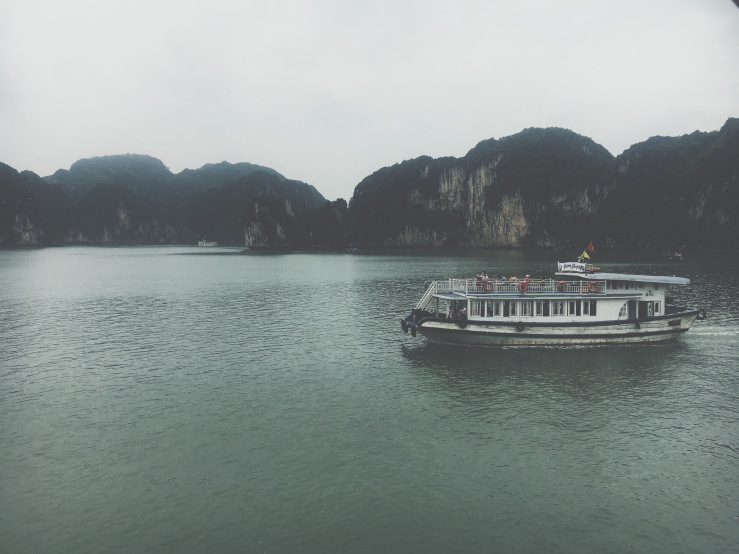After having spent a few days in Hanoi and experiencing much of a vibrant urban atmosphere we were all very excited for the weekend and the cruise of Ha Long Bay. With the week planned full with excursions and activities we looked forward to a few days to just enjoy Vietnam and the spectacular scenery of the bay. However, we would be wrong in many, though not all, of our assumptions about that trip.
Ha Long Bay is indeed a beautiful and spectacular place that has rightly earned its categorisation as a UNESCO World Heritage site. The grey skies and clouds only made it seem more magical and mysterious and the stunning views makes one wonder how we could be fortunate enough to experience this thanks to our university. However, as soon as we were on board the realisation that we were there as stereotypical tourists rather than travellers struck, something I for one am not used to seeing myself as. In the caves, on the beach and while having a late night drink on the sun deck one is constantly reminded of how surreal the contrast between the natural and untouched and the exploited and accessible is. While appreciating the chance to experience places like this around the world, I cannot help but wonder if by making them accessible we simultaneously ruin these places? As a student of development and with a great interest in how to achieve sustainable development, queuing our way through ancient caves and watching copious amounts of rubbish floating by in the sea is both frightening and disturbing.

Looking at Vietnam and the rapid development it has experienced in recent years, especially in urban areas, sustainability seem to have been somewhat overlooked. Though it is understandable that a developing country proposed with an opportunity to join the capitalist system in order to develop further, this proposes a great challenge not only to the countries themselves but the whole world. This is because development in the traditional way comes with a price and is often dismissive of environmental sustainability. Sustainable tourism, and development in general is a challenge not only for developing countries but also for the great and industrialised powers of the world. For example, the littering of the sea is part of a greater issue and adds to environmental problems around the world. Recently, a stranded whale with a stomach filled with more than 30 plastic bags, now to be exhibited, was found in Norway, presenting yet another concrete example of how littering destroys the world we live in. If the earth is to stay spectacular, fully functioning and indeed alive and breathing, any kind of development, around the world, must be assessed regarding its sustainability. Is making beautiful and remote places accessible for tourism really sustainable?
Increasing tourism has undoubtedly affected the economy of Vietnam as an important reason and result of the changes that the Vietnamese government have proposed lately. Regarding economic development, urbanisation and industrialisation in general, tourism plays an important role. But if Vietnam, and the world, is to reach the goals of sustainability that are needed to tackle the environmental problems of today, challenges of tourism and development must be acknowledged and go hand in hand with environmental sustainability.

